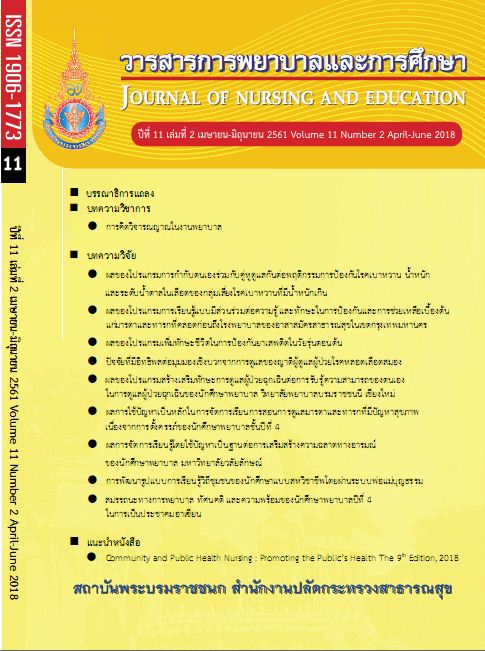Factors influencing the positive aspects of caregiving among stroke family caregivers
ปัจจัยที่มีอิทธิพลต่อมุมมองเชิงบวกจากการดูแลของญาติผู้ดูแลผู้ป่วยโรคหลอดเลือดสมอง
คำสำคัญ:
มุมมองเชิงบวกจากการดูแล, ญาติผู้ดูแล, ผู้ป่วยโรคหลอดเลือดสมองบทคัดย่อ
บทคัดย่อ
ญาติผู้ดูแลเป็นทรัพยากรสำคัญในระบบการดูแลผู้ป่วยโรคหลอดเลือดสมองระยะยาว การวิจัยแบบหาความสัมพันธ์เชิงทำนายนี้มีวัตถุประสงค์เพื่อศึกษาปัจจัยที่มีอิทธิพลต่อมุมมองเชิงบวกจากการดูแลของญาติผู้ดูแล กลุ่มตัวอย่างเป็นญาติผู้ดูแลผู้ป่วยโรคหลอดเลือดสมองที่อาศัยในจังหวัดสระบุรี ซึ่งได้จากการสุ่มแบบแบ่งกลุ่มหลายขั้นตอน จำนวน 120 ราย เครื่องมือที่ใช้เก็บรวบรวมข้อมูลเป็นแบบสัมภาษณ์ ครอบคลุมสาระเครือข่ายทางสังคม การได้รับการสนับสนุนทางสังคม การรับรู้ภาระการดูแล การรับรู้ความสามารถตนเอง กิจกรรมเพิ่มสุขในชีวิตประจำวัน และมุมมองเชิงบวกจากการดูแลมีค่าความเชื่อมั่นเท่ากับ .94, .94, .94, .94, .80, และ .91 ตามลำดับ วิเคราะห์ข้อมูลด้วยสถิติเชิงพรรณนา และสถิติถดถอยพหุคูณแบบขั้นตอน
ผลการวิจัยพบว่า กลุ่มตัวอย่างมีมุมมองเชิงบวกจากการดูแลผู้ป่วยโรคหลอดเลือดสมองภาพรวมอยู่ในระดับมาก โดยมีมุมมองเชิงบวก 3 อันดับแรกคือ รู้สึกดีกับตนเองที่ได้ตอบแทนบุญคุณบุคคลอันเป็นที่รัก รู้สึกว่าตนเองมีความสำคัญ และรู้สึกว่ามีคนต้องการตนเองตามลำดับ โดยปัจจัยกิจกรรมเพิ่มสุขในชีวิตประจำวัน การรับรู้ความสามารถของตนเอง การรับรู้ภาวะสุขภาพ และการรับรู้ภาระการดูแลสามารถร่วมกันทำนายมุมมองเชิงบวกจากการดูแลของญาติผู้ดูแลผู้ป่วยโรคหลอดเลือดสมองได้ร้อยละ 49.1(R2 = .491, F = 27.700 p < .001) จึงมีข้อเสนอแนะว่า พยาบาลและบุคลากรทางสุขภาพควรสนับสนุนให้ญาติผู้ดูแลมีกิจกรรมเพิ่มสุขในชีวิตประจำวันส่งเสริมการรับรู้ความสามารถตนเองเพิ่มการรับรู้ภาวะสุขภาพ และลดภาระในการดูแล เพื่อนำไปสู่การเพิ่มมุมมองเชิงบวกจากการดูแลของญาติผู้ดูแลผู้ป่วยโรคหลอดเลือดสมอง
เอกสารอ้างอิง
1. Strategy and Planning Division, Ministry of public health. [Online]. 2018 Available from: file:///C:/Users/User/Downloads/23-4-2558-6.pdf
2. Sunsern, R., Timsuwan, B., Lawang, W. Developing Disabled Caregiving System Based on Families and Communities. Journal of Nursing and Education. 2013; 6 (3): 25-41. (in Thai)
3. Lawang, W., Horey, DE., Blackford, J. Family caregiver of adult with acquired physical disability: Thai case-control study. International Journal of Nursing Practice. 2015; 21: 70–77.
4. Lawang, W., Sunsern, R. Positive aspect of caregiving: Crucial concepts enhancing family caregivers’ strength. Journal of Nursing and Education. 2016; 9(3): 1-9. (in Thai)
5. Hunt CK. Concept in caregiver research. Journal of Nursing Scholarship. 2003; 35: 27-32.
6. Cassidy, T. Benefit finding though caring: The cancer caregiver experience. Psychology & Health. 2013; 28: 250-266.
7. Tarlow BJ, Wisniewski SR, Belle SH, Rubert M, Ory MG, Gallagher-Thompson D. Positive aspects of caregiving: Contributions of the REACH project to the development of new measures for Alzheimer’s caregiving. Research on aging. 2004; 26(4): 429-53.
8. Li Q, Loke AY. A systematic review of spousal couple‐based intervention studies for couples coping with cancer: direction for the development of interventions. Psycho‐Oncology. 2014; 23(7): 731-9.
9. Kate N, Grover S, Kulhara P, Nehra R. Caregiving appraisal in schizophrenia: A study from India. Social Science & Medicine. 2013; 98: 135-140.
10. Kang J, Shin DW, Choi JE, Sanjo M, Yoon SJ, Kim HK, Oh MS, Kwen HS, Choi HY, Yoon WH. Factors associated with positive consequences of serving as a family caregiver for a terminal cancer patient. Psycho‐Oncology. 2013; 22(3): 564-71.
11. Lopez-Hartmann, M., Wens, J., Verhoeven, V., Remmen, R. The effect of caregiver support interventions for informal caregivers of community-dwelling frail elderly: A systematic review. International journal of integrated care. 2012; 12(12): 133-138.
12. Carbonneau, H., Caron, C., Desrosiers, J. Development of a conceptual framework of positive aspects of caregiving in dementia. Dementia. 2010; 9(3): 327-53.
13. House JS. Work stress and social support. Reading M.A. Addison-Wesley. 1981.
14. Polit DF, Beck CT. Nursing research: Generating and assessing evidence for nursing practice. Lippincott Williams & Wilkins; 2012.
15. Lawang, W., Sunsern, R., Rodjarkpai, Y. Factors influencing the health status of relatives of elderly caregivers of chronic ill persons at home in the eastern region. Journal of Public Health. 2005; 19(1): 61-78. (in Thai)
16. Toonsiri, C., Sunsern, R., Lawang, W. Development of the burden interview for caregivers of patients with chronic illness. Journal of Nursing and Education. 2011; 4: 62-75. (in Thai)
17. Lawang, W., Sunsern, R. Development of the self-efficacy measurement scale of caregivers. Chonburi: Burapha University. 2016. (in Thai)
18. Lawang, W., Sunsern, R. Development of the pleasant events schedule measurement scale of caregivers. Chonburi: Burapha University. 2016. (in Thai)
19. Pankong, O., Pothiban, L., Sucamvang, K., Khampolsiri, T. A Randomized Controlled Trial of Enhancing positive aspects of caregiving in Thai dementia caregivers for dementia. Doctoral thesis, Faculty of Nursing, Chaingmai University. 2016. (in Thai)






